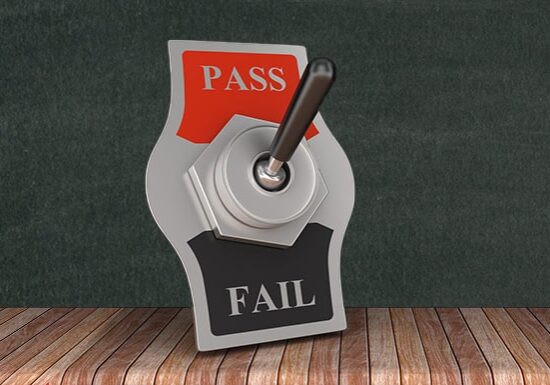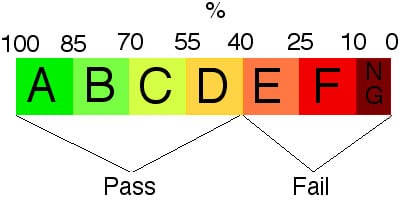Do Pass/Fail Classes Affect Your GPA?
Updated: June 19, 2024
Published: January 12, 2020

Did you know that you can take college classes without receiving a letter grade? The system of pass fail classes means that instead of the traditional grading where you receive a letter grade of A to F, your grade becomes a binary — either you pass or you fail.
For some people, a pass/fail system is beneficial. Others may go through their entire college career without ever electing to be graded by this system.
How should you decide when it’s considered an advantage versus when to ignore the option?
Importantly, you’re probably asking yourself, “How do pass/fail classes affect GPA?” along with other questions.
In this article, we will share everything you need to know about pass/fail classes so you can understand when to opt for it and when to forget it exists.

Source: Wikimedia Commons
What are Pass/Fail Classes?
Traditional grading systems are based on letter grades. Each percentage is associated with a letter, as you likely already know from your experience in school. For example, 90% or higher is an A, 80%-89% is a B, and so on.
But when you take a class as pass/fail, you receive a pass for any grade higher than a D. In some universities, they are more strict. As such, only letter grades C or higher are considered passing. To know how your college of choice breaks down a pass versus a fail, be sure to check the documentation online or ask an advisor directly.
Advantages of Pass/Fail Classes
There are some great advantages of taking a class as pass/fail versus a letter grade.
The main advantage is for coursework that is outside of your major. Say, for example, you are majoring in Computer Science, but you plan to take an Art History class as an elective. Since the Art History class does not count towards your major, and you are less likely to be as well versed in the information as Art History majors, you may want to consider taking the class pass/fail. That way, you can still attend class, receive credit for the course, but you can prioritize your time to study harder for those classes that are directly related to your degree.
Additionally, it also means that you can try something new and explore a subject purely out of interest. This is a major advantage because you may not know how you will perform in an unknown subject, but you are still interested in learning about it.
Given the pass/fail option, you can rest assured knowing that your GPA will not be negatively impacted as long as you pass (in most cases).
This brings us to a good question: How is your GPA affected by pass/fail classes?
Pass/Fail Classes and Your GPA
When you pass a pass/fail class, your GPA remains unaffected. This is a good thing!
However, if you fail the class, you could potentially harm your GPA.
Of course, this calculation varies by your university, so again, it’s useful to consult directly with your advisor or read policies online.
In most cases, when you pass the class, the units count on your transcript toward reaching your graduation requirements.
If you fail, though, the zero points can harm your GPA since you are adding zero points into your GPA calculation. This is because the course still counts as a class you took, so your GPA is divided by a larger number of classes, but the sum of your grades remained unchanged. Therefore, it can lower your GPA.
On the other hand, some schools may not calculate the zero points into your GPA calculation. And, naturally, you don’t receive the units for the course either because you did not pass.
Disadvantages of Pass/Fail Classes
As with anything with advantages, the other side of the coin brings up the disadvantages.
You still have to factor in the amount of time the class will take and the effort level it will require to pass. Depending on how the professor grades, your attendance could matter. Your tests and assignments determine your grade, so it’s not as if the class isn’t part of your schedule.
But knowing that a class is pass/fail could cause you to care a little less than your other courses and you may have a higher risk of slacking off. This is particularly dangerous when participation and attendance counts towards your grade and could cause you to end up failing.
Furthermore, if you are planning to attend graduate school, having a lot of classes taken as pass/fail rather than a letter grade could be misinterpreted for laziness.
Also, if you end up failing a pass/fail class, this really will raise a red flag. Therefore, when you choose to take a class for a pass/fail grade, you need to be sure you are in the right mindset. You must still treat it as a college class and take it seriously.
Naturally, it can be less stressful than a letter grade because the range for a pass is an A-C or A-D, but you need to make sure you pass!
When to Choose Pass/Fail Over Letter Grade
As mentioned throughout this article, there are a few reasons why you’d want to select taking a college class as pass/fail over a letter grade. Here are the most outstanding reasons why it makes sense to do so:
1. When the class is NOT required for your major
2. When there’s no other alternative
3. Personal enrichment
4. When the course can harm your GPA otherwise

Photo by Siora Photography on Unsplash
When NOT to Choose a Pass/Fail Option
Sometimes, it’s the right choice. But, in other instances, it most certainly is not. Don’t take a pass/fail option if:
1. The class counts for your major
2. You’ve already taken a lot of classes as pass/fail (as a general rule of thumb: don’t take more than one pass/fail class each semester and don’t take more than four total in a four-year program)
How to Sign Up
When you enroll in classes, you can select how you want to be graded. This can also be changed mid-way through the semester. Depending on your school’s policy, you may be able to change this selection online, whereas some schools may require approval from your professor and a visit to the Office of the Registrar.
Policies and Options
It cannot be overstated how important it is to check with your university about their pass/fail policies and options.
For example, there are other considerations besides your GPA to consider when electing to take a course for a pass/fail grade. Consider the following:
1. Some universities may bar you from retaking a course you failed if you chose to take it for a pass/fail grade
2. Some universities define what types of class can and cannot be taken for a pass/fail grade
3. Some universities only allow students with a specific number of earned units to select this option (i.e. juniors and seniors)
4. Some universities limit the amount of pass/fail classes you can take
5. Some universities have differing policies for transfer students and this grading option
Does the Professor Know?
In most cases, your professor won’t even know if you are taking a class for pass/fail or a letter grade. Instead, you receive a letter grade from the professor based on their grading policy. Then, the Office of the Registrar changes the grade to pass or fail for it to show on your transcript.
The Bottom Line
Ultimately, knowing whether or not to take a class pass/fail or for a letter grade is a decision that you have to make for yourself. However, by following these aforementioned considerations, you should have a better idea for what classes it will make sense for, if any.
It may be the case that there is no need to take a class for a pass/fail grade throughout your entire college career if you don’t want to. It’s a subjective choice that could just benefit you if you want to try something new or already have too much on your plate to balance and don’t want to hurt your GPA.
Speaking of having too much to do in college, there are alternatives to attending traditional on-campus universities that provide you with an equal quality of education. Online universities like the University of the People are a great option, especially for students who want to take advantage of earning their education tuition-free and on their own schedule, from anywhere in the world since everything is 100% online. Learn more about our students’ experience studying at UoPeople here.
